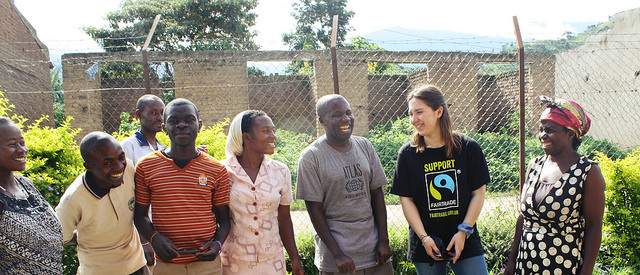Involving Young People as Volunteers
Overview
This information sheet is designed to help your organisation recognise the value of engaging young people (aged 14–25) as volunteers and offer practical advice on how to create an inclusive, youth-friendly environment. Whether you’re new to involving young people or looking to enhance your current approach, this information will help you attract, engage, protect and support young volunteers in meaningful ways.
On this page
- Why involve young people as volunteers?
- Benefits of volunteering for young people
- Benefits of involving young volunteers for organisations
- Getting ready to involve younger volunteers (under 18s)
- Ideas for involving young people as volunteers
- Youth led volunteering projects
- How to recruit young volunteers
- Ensuring young people understand the role and agree this is for them
- Volunteer satisfaction for young people
Why involve young people as volunteers?
Think beyond the project. Involving young people can help your organisation reach its mission and goals in innovative ways. Young volunteers bring new ideas, energy, and fresh perspectives. When they volunteer at a young age, they’re also more likely to continue volunteering as adults—becoming your future supporters, trustees, and advocates.
Benefits of volunteering for young people
- Gain meaningful experiences and have fun
- Make a positive impact in their community
- Develop social and communication skills
- Boost mental health and wellbeing
- Build connections across generations
- Explore career paths and gain practical experience
- Learn new skills and build self-confidence
- Access training, accreditation, or qualifications
- Strengthen future education and employment prospects
Benefits of involving young volunteers for organisations
- Bring fresh ideas, creativity, and diverse perspectives
- Increase diversity in your volunteer base
- Engage new networks, including families and schools
- Access alternative funding opportunities for youth-focused projects
- Develop future leaders and advocates for your cause
Getting ready to involve younger volunteers (under 18’s)
Can under-18s volunteer?
Yes, they can! There are no legal age restrictions for volunteers. However, it’s important to ensure the roles are suitable and practical for young people, considering their commitments such as school or work.
Health and Safety
You have a ‘duty of care’ for all volunteers, including under-18s. It’s recommended to:
- Complete individual risk assessments for young volunteers
- Consider their maturity and experience level
- Check local bylaws or guidelines with your local authority
Insurance
Ensure your volunteers are covered under your Public or Employers’ Liability insurance. If your policy has an age limit, such as a minimum of age of 18, speak to your insurers explaining the roles that younger volunteers would undertake and their ages. You may be asked to provide information regarding the supervision that will be provided. This can be a straightforward process and often be done at no extra cost.
Safeguarding
Young volunteers need to be safeguarded whilst volunteering. Staff or volunteers that will be left alone with younger volunteers will need a DBS and will benefit from training and support around supervising younger volunteers. Similarly, there are safeguarding issues when the young person themselves is volunteering with vulnerable groups including other children. It is good practice to have in place a safeguarding policy when you involve anyone under the age of 18, whether as a volunteer or service user.
Any volunteering activity that has unsupervised access to vulnerable groups, including children, is not advised for volunteers under 18.
However, if a young volunteer over the age of 16 is involved such activities you will need to consider if they should undergo other safer recruiting procedures such as Disclosure and Barring Services (DBS) checks. Further information on DBS provider checking services can be found on the WCVA website.
Safeguarding advice
Parental consent
For volunteers under 18, involve parents or guardians by:
- Sharing information about the role, including times and locations
- Obtaining consent for participation and photos (if under 16)
Young people living independently (16+) can give their own consent.
Ideas for involving young people as volunteers
It’s important to ask young people how they want to be involved. Giving young people a say, shows you respect their opinions and want to listen to them.
Co-producing roles and projects with young people creates a sense of ownership and connection to your organisation and cause. Their input can lead to innovative ideas and increased satisfaction for both parties.
Examples of roles
- Creative opportunities – a young person interested in design could become a ‘Volunteer Display Designer’ at a charity shop.
- Short-term opportunities – a six-week marketing volunteering role for students to apply their skills to your social media strategy.
- Group opportunities – Roles such as gardening, litter picking, or creating food parcels can be appropriate for peer or family groups.
Youth-led volunteering projects
Consider inviting young volunteers to lead a project, such as organising a fundraising event or developing an awareness campaign. Youth-led social action projects are often eligible for specific funding, creating a win-win opportunity for your organisation and the young people involved.
How to recruit young volunteers
Young people are everywhere! Here are some ways to reach them:
- Schools, colleges and universities – partner with teachers and career advisors and explore opportunities to join career fairs or exhibitions (these are typically in September and October)
- Youth groups and clubs – build relationships with local youth centres or uniformed youth units such as Scouts or Guides
- Social media – use youth-friendly platforms to promote opportunities.
- Word of mouth – encourage current young volunteers to spread the word.
- Contact your local Volunteer Centre to find out what networks they already have
- Use the national volunteering database, Volunteering Wales, to promote your volunteering opportunities
- Check your existing publicity, is this attractive to young people and reaching a youth audience? If not, some specific and targeted materials may be useful. (If young people cannot see themselves in your publicity, they may assume it is not for them)
Ensuring young people understand the role and can agree this is for them
A common myth is that young people are unreliable and immature. This is not true, providing meaningful roles and providing great support leads to valuable contributions.
Young people are people; like everyone else, no two are alike. If you are unsure whether they understand the role during recruitment, why not invite them to a taster session and give them an opportunity to find out more and to see if the role is right for them?
You will need to take into consideration pressures of schoolwork, jobs and social time. This can be discussed during the initial chat or after a taster session or training (and be revisited at supervision session to check for any changes) so you can discuss role, regularity of involvement and support needs. It is best practice to be as flexible as possible as an organisation so that you can remove any potential barriers and ensure the best experience for your volunteers.
Some young people would prefer to volunteer with their friendship groups, so it is worth considering if there are roles that could be available to pairs or groups of volunteers to undertake together.
Volunteer satisfaction for young people
How can you show your young volunteers that you value them and encourage them to continue to volunteer with you?
First, get the basics right! Reimburse travel expenses, provide snacks, offer welcoming support and ongoing supervision.
Consider why they are volunteering. Is it because they want to,
- do something fun?
- gain new skills?
- make friends or connections?
- add to their CV or as part of a programme? (i.e. Welsh Baccalaureate or the Duke of Edinburgh Award)
- give something back or feel they are making a difference?
Can you help fulfil these needs in how you create and shape the role?
If volunteers are looking for fun, or to make new friends, could you build in opportunities for informal conversations, perhaps by using fun conversation starters, or encourage ways to complete tasks in a more amusing way? You may offer social events, which can help volunteers settle in and to build connections. Young people can be great at coming up with ideas for this.
If volunteers are looking to build their skills or access training or qualifications, could you offer training and qualifications? If the training is not accredited externally, you could accredit it internally by setting several standards and outcomes for the young person to achieve.
If volunteers want to make a difference, how can you enable volunteers to understand the contribution they are making? For example, did the charity shop window display bring in 50% extra customers, and help the charity raise an extra £100 which will provide several nights of care for an animal in shelter?
The motivations and ways people volunteer, particularly young people, have changed. It is becoming more typical for individuals to volunteer in more of a ‘portfolio’ style, selecting types of volunteering, or specific projects that enable volunteers to gain particular experiences or to demonstrate their ability. Changing or splitting your volunteering roles into accessible and agreeable tasks may be more attractive to some individuals. This could be relevant for students, , employees looking for a short-term intervention to support a volunteer involving organisation or someone on a gap year or sabbatical looking to have a variety of experiences
Recognising young volunteer’s achievements is a great way to make volunteers feel valued and celebrate their success. You may run internal volunteering awards which you could nominate volunteers for.
As each organisation is different, you may be able to celebrate and recognise your volunteers in other ways too. Where possible, it is always worth asking your volunteers how they would like to celebrate their achievements to ensure maximum happiness and satisfaction within your organisation.
Finally, don’t forget to let young people know that you and any beneficiaries really appreciate that they are giving their time. Seeing the difference, they make and knowing that it is valued can help a young person become more confident, help them feel a part of the community and have a sense of responsibility for it. Showing appreciation can be as simple as saying thank you, giving a card or certificate, or as elaborate as throwing an awards ceremony to celebrate volunteers’ contributions.
Further reading

Involving Young People in Volunteering and Social Action


